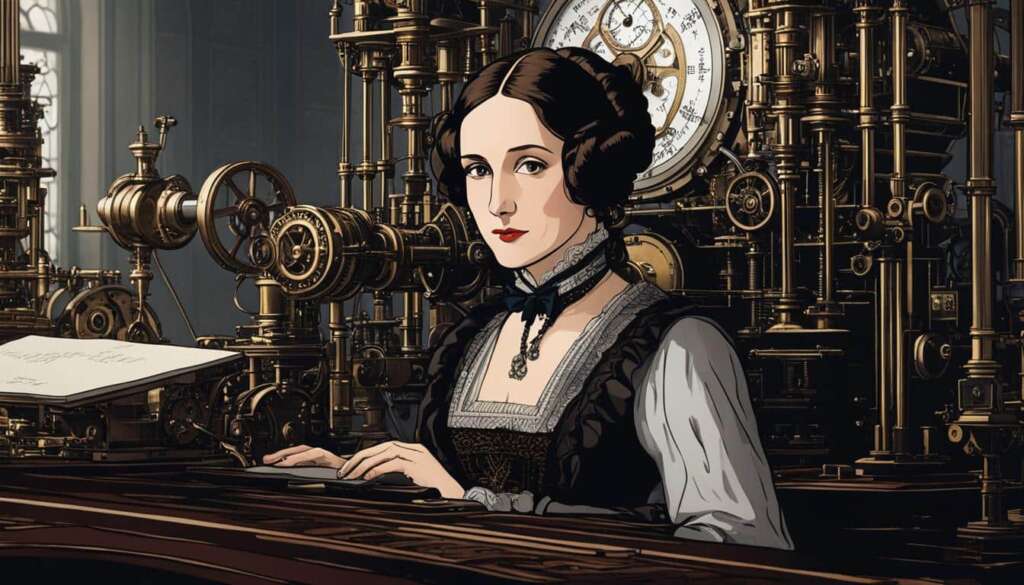Table of Contents
Explore the fascinating world of Ada Lovelace, the visionary pioneer of computer programming, with our Lovelace in Computing History Crossword Puzzle. Test your knowledge of early computing, algorithms, and the analytical engine, while uncovering the remarkable achievements of Ada Lovelace, the first computer programmer in history.
Ada Lovelace, also known as Augusta Ada King, Countess of Lovelace, was an English mathematician and writer who played a pivotal role in shaping the course of computer history. Collaborating with Charles Babbage, the inventor of the analytical engine, Lovelace wrote the first algorithm designed to be executed by a machine, laying the foundation for modern computing.
By completing our lovelace in computing history crossword, you’ll delve into the world of early computing, discover the ingenuity behind Lovelace’s work, and gain a deeper understanding of her contributions to the field of computer science.
Early Computing and the Analytical Engine
During the early 19th century, Charles Babbage conceptualized the idea of the analytical engine, a machine capable of performing complex calculations and executing instructions stored on punched cards. Although the analytical engine was never built during Babbage’s lifetime due to technological limitations, his ideas were revolutionary and laid the foundation for modern computers. Ada Lovelace recognized the potential of Babbage’s concept and worked closely with him to develop the machine further. Lovelace’s contributions to the analytical engine, including her algorithm for generating Bernoulli numbers, established her as the world’s first computer programmer.
Charles Babbage’s analytical engine was an ambitious project that aimed to revolutionize early computing. The machine was designed to perform both numerical calculations and logical operations using punched cards. Babbage believed that the analytical engine had the potential to carry out complex tasks, far beyond what any existing machinery could accomplish. However, due to various challenges, including limited funding and technological constraints, the analytical engine was never fully realized during Babbage’s lifetime.
Despite the analytical engine’s unrealized state, its impact on the field of computing cannot be overstated. The concepts and principles proposed by Babbage formed the basis for modern computers and laid the groundwork for subsequent technological advancements. In particular, Babbage’s collaboration with Ada Lovelace played a crucial role in shaping the early development of computing.
Ada Lovelace, often referred to as the first computer programmer, recognized the potential of Babbage’s analytical engine and worked closely with him to refine and expand upon its capabilities. Lovelace’s groundbreaking contributions included her development of an algorithm for generating Bernoulli numbers, making her the first person to conceive of a program for a machine. Her algorithm showcased the analytical engine’s capability to execute complex mathematical operations and demonstrated the machine’s potential as more than just a calculator.
The science of operations, as derived from mathematics more especially, is a science of itself, and has its own abstract truth and value; but where it is not sought for its own sake, because its truths and values are not what the primary principles of abstract truth and value are concerned in; it is pursued as subservient to what those principles are concerned in.
Lovelace’s insights and contributions to the analytical engine marked a pivotal moment in computing history. Her work demonstrated that machines could be programmed to perform a wide range of tasks beyond simple numerical calculations. Lovelace envisioned the potential for computers as tools for creativity and innovation, foreshadowing the digital age we now live in.
| Key Figures in Early Computing | Contributions |
|---|---|
| Charles Babbage | Conceptualized the analytical engine, laying the foundation for modern computers |
| Ada Lovelace | Developed algorithms for the analytical engine, establishing her as the world’s first computer programmer |
| Other mathematicians and engineers | Contributed to the advancement of early computing through their research and inventions |
The legacy of early computing and the analytical engine lives on in the modern technological landscape. The visionary ideas of Charles Babbage and the pioneering work of Ada Lovelace laid the groundwork for the development of modern computers and programming. Their contributions continue to shape the way we interact with technology and fuel ongoing advancements in the field of computing.
The Legacy of Ada Lovelace
Ada Lovelace’s contributions to the field of computing were groundbreaking and have had a lasting impact on the development of computers and programming. Her recognition of the analytical engine as more than just a calculator and her formulation of the first algorithm paved the way for the future of computing. Lovelace’s work demonstrated that a machine could be programmed to perform a variety of tasks beyond simple numerical calculations. Her insights into the potential of computers as a tool for creativity and innovation laid the foundation for the digital age we live in today.

Ada Lovelace’s work on the analytical engine showcased her visionary thinking. She envisioned an engine that could not only crunch numbers but also manipulate symbols and create new algorithms. Her breakthrough algorithm for the analytical engine, which could calculate Bernoulli numbers, was a significant leap forward in computer programming.
Ada Lovelace’s understanding of the analytical engine’s potential went beyond its practical applications. She believed that it could be used as a tool for creativity and that machines had the capacity to create art and music. Lovelace’s insights into the artistic and innovative capabilities of computers were far ahead of her time.
Lovelace’s visionary ideas laid the foundation for the tremendous advancements we see in computer science today. Her work showcased the incredible potential of machines and algorithms and inspired generations of programmers and engineers to push the boundaries of what computers can do.
Exploring Lovelace’s Achievements Through a Crossword Puzzle
This crossword puzzle is designed to celebrate the achievements of Ada Lovelace in the field of computing. The clues and answers in the puzzle highlight key aspects of Lovelace’s life and work, including her collaboration with Charles Babbage, her development of algorithms for the analytical engine, and her status as the world’s first computer programmer. By completing this crossword, you can test your knowledge of Lovelace’s contributions to computing history and gain a deeper appreciation for the impact she has had on the field.
To commemorate Ada Lovelace’s groundbreaking work in the field of computing, we have created a crossword puzzle that explores her accomplishments and contributions. This puzzle will challenge your understanding of Lovelace’s role in computer history while simultaneously highlighting important aspects of her life and work. Take on this crossword and test your knowledge of the world’s first computer programmer.
Conclusion
Ada Lovelace’s pioneering work in the field of computing has left a lasting legacy. As the world’s first computer programmer, her contributions to the development of the analytical engine and the formulation of algorithms laid the foundation for modern computing.
Through this crossword puzzle, we hope to celebrate Lovelace’s achievements and inspire a deeper appreciation for her role in the history of computing. By exploring and completing this puzzle, you can engage with the story of Ada Lovelace and her important contributions to the field.
Ada Lovelace’s brilliance and vision continue to inspire computer programmers and innovators to this day. Her achievements serve as a reminder of the crucial role women have played in shaping the world of technology. As we reflect on Lovelace’s remarkable accomplishments, we recognize the importance of celebrating and highlighting the diverse voices and talents that have shaped the field of computing.
FAQ
Who was Ada Lovelace?
Ada Lovelace, also known as Augusta Ada King, Countess of Lovelace, was an English mathematician and writer who is credited with being the world’s first computer programmer.
What is the analytical engine?
The analytical engine was a proposed mechanical general-purpose computer developed by Charles Babbage. It was capable of performing complex calculations and executing instructions stored on punched cards.
What is Ada Lovelace’s contribution to computing?
Ada Lovelace wrote the first algorithm intended to be carried out by a machine, making her the first computer programmer in history. Her work on the analytical engine laid the foundation for modern computing.
Why is Lovelace considered the world’s first computer programmer?
Lovelace’s algorithm for generating Bernoulli numbers is considered the first program specifically designed for a machine. She recognized the potential of the analytical engine beyond mere calculation and formulated a method for programming it.
What impact did Ada Lovelace have on the development of computers?
Lovelace’s work demonstrated that computers could be programmed to perform a variety of tasks beyond simple numerical calculations. She laid the foundation for the digital age we live in today.
What does the crossword puzzle highlight about Ada Lovelace’s life and work?
The crossword puzzle highlights key aspects of Lovelace’s life and work, including her collaboration with Charles Babbage, her development of algorithms for the analytical engine, and her status as the world’s first computer programmer.







